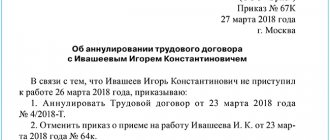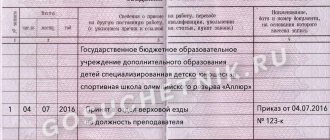Concept and types of labor disputes
In Russian legislation, a labor dispute is understood as a conflict that has formed between an employer and his subordinate, which was submitted for consideration by a court or a special commission. Such disputes may be individual or collective. In the second case, the company may suffer serious losses as a result of the litigation.
Most often, a dispute is preceded by a violation by the employer of the rights of employees. This may be expressed in delayed wages, refusal to provide leave, or illegal layoffs. In addition, there are often conflict situations when the employer makes excessive demands, forces people to work on weekends without pay, and adds responsibilities not covered by the current employment contract.
Often a labor dispute arises when an employee quits and receives a paycheck. Unscrupulous workers try to pay settlements as little as possible and use various tricks to achieve this goal. This is especially true if the employee’s occupation involved material assets.
Labor disputes - types and causes
Labor disputes are disagreements that may arise between an employee or group of employees and a supervisor. Therefore, they can be not only individual, but also collective in nature. Such contradictions may arise when labor law norms are not observed or when participants in a legal relationship do not comply with the established requirements of regulations.
If the rights of one employee or an entire team were violated and this situation was not resolved pre-trial, then employees have no choice but to defend their case in a legal authority.
Disagreements between an employee(s) and a manager may arise for the following reasons:
- when an employee is delayed at work until the production task is fully completed;
- if the terms of the collective labor agreement are not observed;
- due to a violation of relations that are associated with the financial responsibility of the parties;
- if a person has received an illegal refusal to hire from an employer;
- due to non-payment of compulsory social insurance to an employee.
There are many other issues on which labor disputes may arise. The Labor Code of the Russian Federation, namely Chapters 60 and 61, describes in detail the procedure for their consideration. And also the Constitution of the Russian Federation states that workers have the legal right to strike.
Deadlines for application and limitation, consideration
The statute of limitations is a certain period during which a citizen can go to court to restore or protect his rights. Yes, Art. 196 of the Civil Code of the Russian Federation, establishes a period of 3 years from the date of discovery of violations of rights. However, in the current labor legislation there is no concept of a claim period, but the definition of “time limit for filing a lawsuit” is used.
According to the Labor Code of the Russian Federation, for individual labor disputes the period for going to court is 3 months from the date of discovery of a violation of rights. There are exceptions:
- a month is given to apply for dismissal, the period is counted from the date of issue of the work book or a copy of the dismissal order;
- one year to resolve a dispute regarding withheld wages, settlement and other types of cash payments;
- year for conflicts related to damage caused to the enterprise by an employee, the deadlines are counted from the date of discovery of the damage.
Restoring deadlines for labor disputes is possible only on the basis of a court decision and only if they were missed for valid reasons.
The period for appealing a decision on a labor dispute is one month from the date of its adoption. It should be taken into account that the court prepares a decision within up to two weeks, and therefore there is a risk of not having time to file an appeal. To avoid this, it is recommended to declare your disagreement with the court decision immediately from the moment it is made, and send a written complaint upon receipt of the formalized court decision.
As for the timing of applying for protection regarding collective labor disputes, everything will depend on the method of resolving the conflict:
- the conciliation commission must consider the dispute within 5 days;
- the intermediary is given no more than seven days, and it may take no more than three days to attract him;
- labor arbitration will consider the dispute for no more than five days.
If a collective labor dispute is considered by the Federal Service for Labor and Employment, the period for consideration will not exceed one month.
Procedure for consideration of labor disputes
The procedure for resolving individual and collective labor disputes will differ. To understand how to act in a specific situation, consult with a lawyer. Below is only a general procedure.
There is no claim procedure for labor disputes in accordance with the modern Labor Code of the Russian Federation. This means that the employee is not required to write a claim to the employer. You can try to resolve the conflict with the employer by drawing up an appropriate document that will indicate the requirements and relevant references to legal norms, but it is not a fact that the employer will meet you halfway.
Procedure for considering collective labor disputes
Collective labor disputes can be resolved both pre-trial and through court. The main stages and procedure for resolving the conflict in this case will be as follows:
- consideration of the issue by a commission for reconciliation of the parties;
- participation in the resolution of the dispute by an independent mediator;
- involvement of arbitration in labor relations;
- initiation of legal proceedings if a pre-trial settlement attempt fails;
- compliance with a court decision by the employer.
As practice shows, the court most often sides with the employee who is least protected in labor relations.
Collective labor disputes are among the most complex. The deadlines for submitting the necessary documents are short here; it can be difficult to collect evidence, especially if employers prevent this. Therefore, it is better to entrust the protection of workers’ rights to an experienced lawyer; this will significantly increase the chances of winning a lawsuit.
Procedure for considering individual labor disputes
In the case of an individual labor dispute, the pre-trial procedure is also applicable. The employee can try to negotiate with the employer and find a compromise solution. In many cases, the violation of an employee's rights is due to a technical error that can be easily corrected.
If the search for a compromise with management fails, the employee can appeal to the labor dispute commission. The main thing is not to forget about the deadline, which is 3 months from the date of violation of rights or discovery of this fact. If the deadline is missed for a good reason, it can be restored without any problems. If one of the parties does not agree with the commission’s decision, a claim can be filed in court. His decision can also be appealed in accordance with the procedure established by law.
The procedure for their resolution
Individual and collective labor disputes are resolved by special authorized bodies. Their choice depends directly on the causes and nature of the conflict that has arisen in the organization or enterprise.
Individual labor disputes can be resolved in the following ways:
- with the help of the labor inspectorate;
- with the participation of the Labor Dispute Commission (LCC);
- in a court of general jurisdiction.
If conflictual relations arise between the employer and the employee that relate to the sphere of labor, then in this case the employee can submit an application to the CCC. Moreover, he can do this within three months from the moment he learned about the violation of his rights. In this case, the commission is obliged to consider the case received by them within ten days. A special meeting is being convened for this purpose. It must be attended by the employee who submitted the application and the manager or his representative.
If for some reason the employee was unable to attend the meeting, then in this case it will be postponed to another day. And also, to obtain more information, the CCC may invite representatives from the trade union or other specialists to the meeting. In this case, the employee will have to provide evidence that his rights were violated.
At the very end of the meeting, the commission members make a general decision, copies of which are given to the employee and the employer. The boss or manager will be obliged to implement the decision made by the commission within three days. If all conditions are not met, then the employee may file a lawsuit. For example, if the commission found the dismissal of an employee or his transfer to some other position illegal, then under Art. 394 of the Labor Code of the Russian Federation he is required to be reinstated at work.
When an employee has collected sufficient evidence of a violation of his rights, he may not apply to the CCC, but go directly to court. There are also situations when, on the contrary, it is difficult for an employee to find them. Then the best option would be for him to go to the labor inspectorate. Since they collect all the evidence on their own, thanks to an unscheduled inspection. Moreover, the legislation does not establish a deadline for submitting an application to the labor inspectorate.
Collective labor disputes are considered by a conciliation commission. In order for it to be formed, employees must submit a request in writing to their manager . And he, in turn, is obliged to familiarize himself with them and create a commission. It should include an equal number of people from both the employee and employer sides.
If both parties were unable to reach an agreement, then the next time negotiations are carried out with the participation of a mediator. In some cases, at this stage all disagreements are resolved. If this does not happen, then the case goes to labor arbitration. This is exactly what should be the procedure for resolving labor disputes that arise between employees and the manager.
Causes of labor disputes
The prerequisites for the emergence of labor disputes may be different. Sometimes the culprit here is an incorrect interpretation of the provisions of the Labor Code of the Russian Federation, both on the part of the employee and his employer. In some cases, the cause may be various technical errors, such as a software glitch.
Most often, the causes and circumstances of labor disputes will be as follows:
- unexpected change in working conditions under the contract for the employee;
- transfer of an employee to another unit or department;
- fines and other types of disciplinary action;
- refusal to provide vacation or days off due under the employment contract;
- non-compliance with the terms of the schedule (for example, instead of the promised 2/2 schedule, you have to work 6 days a week);
- delays in the payment of wages, incomplete payment;
- dismissal (downsizing) of an employee;
- causing property or other damage to an employer or employee;
- unreasonable, as well as violating the rights of a citizen, refusal to hire (for example, due to nationality).
Labor disputes may also arise due to the fault of the employee himself. Here we can name such reasons as showing up at work while intoxicated, systematic violations of work processes, being late, intentional or accidental damage to property, and violation of internal regulations. In these situations, the employer tries to apply disciplinary measures to the employee, up to and including dismissal, but the employee does not always agree with management’s decision. In controversial situations, it is often easier to hire a lawyer who will help defend the rights of the employee or employer without starting a dispute.
Labor Dispute Commission
A labor dispute commission is a special authority created at a specific enterprise or organization on the initiative of the employer or employees. The body deals with issues of labor disputes, therefore it must include representatives of each party. In turn, the parties to the conflict do not have the right to exert any pressure on the commission members.
To resolve labor disputes through a labor commission, you need to write an application in any form addressed to its chairman. If necessary, documents proving the rightness of the party are attached to the application. No later than 10 days after submitting the application, a meeting will take place, which can take place either in the presence of the applicant or without him. The progress of consideration of the application is recorded and then certified with a special seal or stamp of the organization.
The commission makes decisions through a secret vote of its members. A report on the result is drawn up in writing, which, in addition to the name of the organization and the details of its leader, displays information on the decision of the commission and the results of the secret vote. Copies of the document are transferred to each party to the labor dispute within three days. The commission's decision can be appealed within 10 days. If this does not happen, then after 3 days the decision must be executed.
Certificates issued by labor dispute commissions are equal in force to a writ of execution. However, it is not issued if one of the parties decides to continue the proceedings in court.
Procedure for resolving labor disputes
Resolution of labor disputes in court is permitted if:
- the parties did not reach a consensus on the results of the commission’s work;
- a decision was made to transfer the issue to the court without involving a special commission;
- The commission's decision is not consistent with the laws of the Russian Federation.
In addition to labor disputes between an employee and an employer, appeals from third parties who are not registered with the enterprise are allowed. Such cases include complaints from job seekers.
Where to go in different situations
It is not easy to understand the courts where dissenting parties can turn. The names and ranks of courts differ according to territoriality and type of dispute.
- Employee rights in case of delay in payment of wages
The magistrate decides many issues, however, according to Article 23 of the Civil Code, the list does not include cases where the parties are employers and their employees. For example, in case of non-payment of wages upon termination of the contract with the employer, they go to the district court. However, there are exceptions. When resolving individual claims regarding wages, the claim procedure involves appealing to district courts, and the order procedure involves appealing to magistrates.
The place of appeal is chosen according to the location of the defendant. If a claim is filed by an employee, then the court must be chosen according to the address of the office, branch, or representative office of the enterprise.
Resolution of the Plenum of the Supreme Court of the Russian Federation No. 2, adopted on March 17, 2004, establishes the following list of cases for district courts:
- claims against the employer’s actions related to the termination of the relationship;
- demands for compensation for moral damage. caused by the actions of the administration in the amount of at least 500 minimum wages established by federal legislation at the time of application;
- disagreement with the amount and procedure for payment of earnings.
If the topic of the claim is not related to any of the above claims, according to the decision of the Supreme Court, they apply to the magistrate's court.
Individual and collective labor disputes
Compared to collective labor disputes, individual ones are resolved simply. The employee or employer have the right to agree among themselves to resolve the conflict, submit an application to the labor dispute commission or go to court. In accordance with Art. 382 of the Labor Code of the Russian Federation, the bodies for considering individual labor disputes are only the labor dispute commission and the court.
More difficulties arise if the dispute is classified as collective. In this case, the first step is to resolve differences between the parties. To do this, a meeting or conference of employees is held, at which employee representatives are elected and demands are put forward. According to the law, a meeting will be considered valid if more than half of all employees of the enterprise were present; for a conference the minimum threshold is ⅔ of the number of employees. The employer has no right to obstruct the conduct of these events.
Requests drawn up in writing are submitted to the employer, he is obliged to accept them, consider them and provide a response within three days. If the employer satisfies the workers' demands, a labor dispute does not arise. Otherwise, employee representatives have the right to initiate conciliation procedures:
- consideration of all aspects of the conflict by the conciliation commission;
- involvement of an intermediary;
- consideration of the dispute by labor arbitration.
Neither employees nor the employer have the right to refuse to participate in conciliation activities that are carried out within the time limits regulated by law. At the reconciliation stage, workers have the right to defend and voice their demands through demonstrations, rallies, pickets, but only in compliance with current legislation.
Conciliation procedures for resolving collective labor disputes cannot be done without a conciliation commission. Essentially, this is a body created by the two parties within three days from the start of the dispute. The use of a conciliation commission is mandatory. The employer is obliged to provide all conditions for her work, and she herself is obliged to consider the conflict situation within 5 days. The countdown begins from the date of publication of the decree on its creation.
If the conciliation commission was unable to reach an agreement between the parties, by agreement, a mediator or labor arbitration is involved. The law gives three days for this, starting from the drawing up of a protocol by the conciliation commission. If during this time the parties are unable to agree on the choice of a mediator, the creation of labor arbitration begins. It is created with the participation of the Federal Service for Labor and Employment specifically to consider and resolve issues related to collective labor disputes. The next day (after the creation of arbitration) the parties to the labor conflict are required to hold a meeting, during which they decide to entrust the dispute to the created body. If they agree, the parties draw up a written agreement in which they indicate the mandatory execution of the decision of the authority. In case of violation of the agreement, the case is transferred further to the courts. At this stage, it is important to correctly determine the jurisdiction, competently draw up a statement of claim and collect a serious evidence base. Our labor lawyers will help you with this.
Jurisdiction and jurisdiction of labor disputes
It is not always clear where to turn if labor disputes arise. The Labor Code of the Russian Federation gives a clear answer to this question. Collective disputes are considered by a conciliation commission, and if the conflict cannot be resolved at the first stage, the parties turn to an independent mediator or labor arbitration. The resolution of individual labor disputes, according to Article 382 of the Labor Code of the Russian Federation, is entrusted to the courts and labor dispute commissions (LCD).
The primary bodies for considering individual labor disputes are commissions consisting of an equal number of representatives from each party to the conflict. The employer appoints its representatives by written order, the employees choose them at a general meeting or delegate them through the trade union. Each commission has its own seal and governing body, consisting of a chairman, his deputy and a secretary. All organizational and technical issues related to the activities of the CTS are decided by the employer.
The jurisdiction of labor disputes is determined by Article 24 of the Code of Civil Procedure of the Russian Federation. Such cases are heard by district courts at the location of the defendant—the employing company or its separate division with which the employee is suing. Magistrates and other judicial bodies do not consider labor disputes, complaints and issues arising from labor relations as a court of first instance.
| What most often becomes the subject of litigation? The lion's share of civil cases regarding labor conflicts is opened on the basis of claims filed by employees: for illegal dismissal, discrimination in hiring, non-payment of wages or compensation required by law. The opposite situation, when the employer appears as a plaintiff, is extremely rare. As a rule, we are talking about compensation for material damage caused by an employee. |
Despite the jurisdiction of labor disputes on the collection of wages and other industrial conflicts by district courts, the plaintiff has the right to file a claim in a higher court if he does not agree with the decision of the court of first instance or the defendant refused to comply with it. Find out how to competently resolve complex wage issues so that you don’t have to sue your employees.
Labor Disputes Committee
The department or committee for labor disputes is correctly called “State Labor Inspectorate” or “Rostrud”. Each region has its own website of the organization, which contains contact numbers, reception addresses and other necessary information.
In the scope of its competence, in accordance with Art. 356 Labor Code of the Russian Federation, includes:
- control over compliance by employers with the Labor Code of the Russian Federation;
- presenting orders to the employer to restore the labor rights of employees;
- removal from work of persons who are not familiar with safety precautions or who do not have knowledge on this issue;
- investigation of the causes and circumstances of accidents at work;
- bringing to administrative responsibility persons guilty of violating the Labor Code of the Russian Federation.
In addition, Rostrud may suspend the activities of an enterprise if its management fails to comply with current legislation, resulting in a violation of the rights of workers.
An individual employee can write a letter to Rostrud to assert their rights. In some cases, the result will be obtained even faster than when solving the problem in court. Consult with our lawyer whether it is advisable in your situation to contact the State Labor Inspectorate or whether there is another, more effective way to solve the problem.
Where to contact
To resolve a labor dispute, you need to know where to address the problem. If in the case of a collective dispute, employees can hold a meeting, elect a representative and begin the reconciliation process, then it is more difficult for an individual employee in this matter. Here are several options where you can turn to regarding a labor dispute in Moscow:
- to the labor dispute commission, if there is one at the enterprise or organization;
- to Rostrud;
- to court.
On the official website of Rostrud, without a personal visit, you can submit a letter explaining the essence of the problem. You can also contact us through the Onlineinspektsiya.rf portal. These options are optimal for those who do not have the opportunity to come in person to regulatory organizations or are afraid to do so. All requests received through the portals are considered without fail. As for the question of where to file a claim if you want to resolve a labor dispute through the court, it is important to act in accordance with the jurisdiction.
If you are at a loss and don’t know where to start protecting your interests, contact us. An experienced lawyer will carefully study your issue and tell you where to start and how to achieve justice in a short time with minimal financial costs.
Jurisdiction for labor disputes
When planning to sue an employer, you need to understand which court to send the statement of claim to. The choice is made taking into account jurisdiction; in Russia there are several types of jurisdiction; the following apply to labor disputes:
- Family jurisdiction - in courts of various levels. Thus, the magistrate’s court can resolve issues of labor disputes if they are classified as individual and are not related to issues of reinstatement of a dismissed employee. The district court can resolve collective labor disputes and conflicts related to the reinstatement of an employee.
- Territorial jurisdiction. Causes the most difficulties; to resolve them, you need to contact a lawyer. It happens that the employer, by the terms of the contract, determines the resolution of disputes in court at the place of legal address.
There is an alternative territorial jurisdiction, which is regulated by clause 6 of Art. 29 Code of Civil Procedure of the Russian Federation. According to it, an employee can file a claim in court at his place of residence.
If you decide to initiate legal proceedings regarding a violation of your rights established by the Labor Code of the Russian Federation, contact our lawyers. They will help you decide on jurisdiction, draw up a competent claim, and help create a good evidence base. If necessary, a lawyer can represent the client's interests in court. The specialist will also tell you how to appeal a court decision if you disagree with it and what to do if the employer does not comply with the court decision. People who turn to lawyers for help have a better chance of defending their rights, getting their wages paid, and being reinstated at work.
Customer Reviews
Letter of gratitude to Ermakov A.V.
Review by Gavrichkova A.N. I would like to express my deepest gratitude to Yuri Vladimirovich Sukhovarov for his humane attitude towards my problem and detailed professional advice on solving it. I wish I could meet such people in my life more often.
Sincerely, Gavrichkov Alexander Nikolaevich.
Thanks to Pavlyuchenko A.V. from Sonets V.V. I express my deepest gratitude to Alexander Viktorovich Pavlyuchenko for the consultation and competent approach to the matter, as well as the successful outcome in my problem. I also want to express my gratitude for your kindness. I wish you success in this work that is necessary for us.
Sincerely, Sonets V.V. 05/17/2018
Feedback from Gizatullina Dear leader!
I would like to express my deep gratitude to lawyer Lidiya Aleksandrovna Kuznetsova for her professional advice in solving my problem, for her sensitive, attentive attitude towards me as a client, for her competent approach to the matter. I also want to express my sincere gratitude to the team for their friendliness and professionalism. I wish you continued success in your legal career.
Customer Feedback We thank the employees of Legal Agency of St. Petersburg LLC and, first of all, Yana Maksimovna Matveeva and Andrey Valerievich Ermakov for their highly qualified and thorough consideration of our issue and the prompt solution to our housing problem.
Also to Daria Valentivna Kutuzov for her attentive and friendly attitude towards visitors.
Thanks to Stepanov D.Yu. I express my deep gratitude to lawyer Denis Yuryevich Stepanov for his high professionalism and attentiveness to his case when considering the issue in word with a contractor who improperly completed the work of erecting a screw foundation. The cost of the work amounted to 178,300 rubles. And the court of the Vyborg district (Case No. 2-1432/2018) dated March 12, 2018) to collect, taking into account all fines, 504,800 rubles. Once again, I thank you and wish you success in your future work and only successful business conduct.
Grateful to you, your client. 05/18/18
Gratitude from Truk N.N. I would like to express my gratitude to Vasily Anatolyevich Kavalyauskus, Alexander Viktorovich Pavlyuchenko and Maxim Andreevich Lobur for providing qualified legal assistance, with the help of which my problem was resolved quickly and clearly. When contacted, I always found understanding and attention. It’s good that the “Society for the Protection of Consumer Rights” employs such lawyers and advocates. I wish you success in your future work and defending the interests of consumers.
Sincerely, Truk N.N.
07.05.2018
Gratitude from Potapova T.I. I express my gratitude to Denis Yuryevich Stepanov for the work done, high qualifications, as well as for very clear, accessible help in solving my problem (protection of consumer rights). Excellent, very competent lawyer. Thank you very much!
Sincerely, Potapova Tamara Ivanovna, 07/09/2019
Gratitude from Balitskaya A.S. I express my deep gratitude to Alexander Viktorovich Pavlyuchenko for his efficiency and professionalism in resolving controversial issues. The pre-trial settlement was completed as quickly as possible.
Balitskaya A.S., 05/15/2019
Gratitude from A.P. Sovenova and E.Ya. Komudina Dear lawyers!
Please accept our deep gratitude for your attention, professional approach and desire to help people. We especially want to highlight Dmitry Germanovich, Denis Yuryevich, Daria Valentinovna.
Best regards, A.P. Sovenov, E.Ya. Komudina







